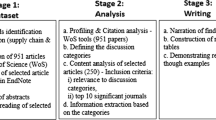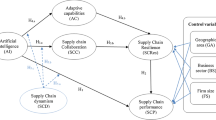Abstract
The functioning and proliferation of global value chains are becoming increasingly important in supply chain management operations. The study aims to identify the drivers of value-added growth as a key indicator of effective global supply chain management. This study provides an opportunity to compare the most influential factors of successful supply chain management through the prism of value added in Russia, China, Japan, Saudi Arabia, Switzerland, and the USA. A comparative economic-mathematical analysis of the influence of variables determining the degree of a country’s inclusion in global value chains was conducted. On this basis, it was proved that the IT sphere can become a competitive advantage for Russia and a prerequisite for inclusion in global value chains. Based on the assessment of supply chain management effectiveness in the context of inclusion in global value chains, it is found that the effectiveness of countries’ participation in them is determined by several drivers. Within the framework of global value chains, there is a change in the mechanism of international competition, in which each of the participants of global chains is interested in the efficiency and success of partners.



Similar content being viewed by others
Data availability
Data will be available on request.
References
Free C, Hecimovic A (2021) Global supply chains after COVID-19: the end of the road for neoliberal globalisation? Account Audit Account J 34(1):58–84. https://doi.org/10.1108/AAAJ-06-2020-4634
Saxena A, Yadav AK (2022) Examining the Effect of COVID-19 on rail freight volume and revenue using the ARIMA forecasting model and assessing the resilience of Indian railways during the pandemic. Innov Infrastruct Solut 7(6):1–13
Ivanov D (2020) Viable supply chain model: integrating agility, resilience and sustainability perspectives—lessons from and thinking beyond the COVID-19 pandemic. Ann Oper Res. https://doi.org/10.1007/s10479-020-03640-6
Ivanov D (2021) Exiting the COVID-19 pandemic: after-shock risks and avoidance of disruption tails in supply chains. Ann Oper Res. https://doi.org/10.1007/s10479-021-04047-7
Gudgin G, Coutts K, Gibson N, Buchanan J (2018) The macro-economic impact of Brexit: using the CBR macro-economic model of the UK economy (UKMOD). J Self-Gov Manag Econ 6(2):7–49
Magableh GM (2021) Supply chains and the COVID-19 pandemic: a comprehensive framework. Eur Manag Rev 18(3):363–382. https://doi.org/10.1111/emre.12449
Lavelli V (2021) Circular food supply chains–impact on value addition and safety. Trends Food Sci Technol 114:323–332. https://doi.org/10.1016/j.tifs.2021.06.008
Epede MB, Wang D (2022) Global value chain linkages: an integrative review of the opportunities and challenges for SMEs in developing countries. Int Bus Rev. https://doi.org/10.1016/j.ibusrev.2022.101993
Deloitte (2021) Tracking the trends 2021. Deloitte. https://www2.deloitte.com/content/dam/Deloitte/ru/Documents/energy-resources/Russian/RU_Tracking-the-trends-2021_final.pdf. Accessed 25 June 2021
ILC (2016) Resolution concerning decent work in global supply chains. https://www.ilo.org/moscow/dw4sd/themes/supply-chains/lang--ru/index.htm. Accessed 25 June 2021.
Centobelli P, Cerchion R, Esposito E (2020) Evaluating environmental sustainability strategies in freight transport and logistics industry. Bus Strategy Environ 29(3):1563–1574. https://doi.org/10.1002/bse.2453
Gygli S, Haelg F, Potrafke N, Sturm JE (2019) The KOF globalisation index–revisited. Rev Int Organ 14:543–574. https://doi.org/10.1007/s11558-019-09344-2
UNDP (2020) Globalization. https://www.un.org/ru/youthink/globalization.shtml. Accessed 25 June 2021
Hu J, Haddud A (2020) Exploring the impact of globalization and technology on supply chain management: a case of international e-commerce business. In: Supply chain and logistics management: concepts, methodologies, tools, and applications, IGI Global, Hershey, Pennsylvania, USA, pp 1353–1576. https://doi.org/10.4018/IJORIS.2017100101
Suryaningtyas D, Sudiro A, Troena A, Irawanto W (2019) Organizational resilience and organizational performance: examining the mediating roles of resilient leadership and organizational culture. Acad Strateg Manag J 18(2):1–7
Drobyazko S, Okulich-Kazarin V, Rogovyi A, Goltvenko O, Marova S (2019) Factors of influence on the sustainable development in the strategy management of corporations. Acad Strateg Manag J 18(S1):1–5
Ever Stream Analytics (2019) Annual risk report 2018. Resilience360. https://www.resilience360.dhl.com/wp-content/uploads/2019/03/Resilience360_Annual-Risk-Report-2018.pdf. Accessed 25 June 2021
Barua S (2020) COVID-19 pandemic and world trade: some analytical notes. SSRN Electron J 3577627:1–35. https://doi.org/10.2139/ssrn.3577627
Marinagia C, Trivellas P, Reklitis P (2015) Information quality and supply chain performance: the mediating role of information sharing. Procedia Soc Behav Sci 175(2):473–479. https://doi.org/10.1016/j.sbspro.2015.01.1225
Shaikh FA, Shahbaz MS, Din SU, Odhano N (2020) The role of collaboration and integration in the supply chain of construction industry. Civ Eng J 6(7):1300–1313
Karpuntsov V, Veresha R (2022) Criminal and administrative aspects of the sociology of law: opportunities for expanding the research and the field of expertise. InterEULawEast J Int Eur Law Econ Mark Integr 9(1):147–165
Veresha RV (2016) Problem of determining the chance (casus) in criminal law. Int J Environ Sci Educ 11(17):10241–10252
Hinkka V, Mäkinen R, Eckhardt J, Lastusilta T (2021) Alternative approach for improvement sustainable supply chain management in the large european container ports. HighTech Innov J 2(2):131–137
Darabseh M, Martins JP (2020) Risks and opportunities for reforming construction with blockchain: bibliometric study. https://doi.org/10.28991/cej-2020-03091541
Raval P, Sarkar D, Devani D (2022) Application of analytical-network-process (ANP) for evaluation of key-performance-indicators (KPI) for application of blockchain technology in infrastructure projects. Innov Infrastruct Solut 7(6):1–23
Centobelli P, Cerchion R, Esposito E (2020) Pursuing supply chain sustainable development goals through the adoption of green practices and enabling technologies: a cross-country analysis of LSPs. Technol Forecast Soc Change 153:119920. https://doi.org/10.1016/j.techfore.2020.119920
Allianz Global Corporate and Specialty (2020) Allianz risk barometer: identifying the major business risks for 2020. https://www.agcs.allianz.com/content/dam/onemarketing/agcs/agcs/reports/Allianz-Risk-Barometer-2020.pdf. Accessed 25 June 2021
Vidrova Z (2020) Supply chain management in the aspect of globalization. SHS Web Conf 74:04031. https://doi.org/10.1051/shsconf/20207404031
Distelhort G, Fu D (2017) Wages and working conditions in and out of global supply chains: A comparative empirical review. In: International labour office, Bureau for employers’ activities (ACT/EMP), Geneva
Al-Humairi SN, Kamal AAA (2021) Opportunities and challenges for the building monitoring systems in the age-pandemic of COVID-19: review and prospects. Innov Infrastruct Solut 6(2):1–10
Milovanović G, Milovanović S, Radisavljević G (2017) Globalization: the key challenge of modern supply chains. Ekonomika 63(1):31–40. https://doi.org/10.22004/ag.econ.290197
EMTEMP (2021) Gartner supply chain top 25 results for 2021. https://emtemp.gcom.cloud/ngw/globalassets/en/supply-chain/documents/trends/global-supply-chain-top-25-report-2021.pdf. Accessed 25 June 2021
Boone C, Manrodt K, Holcomb M (2021) 30th annual study of logistics and transportation trends: Talent and technology. Georgia College and Mississippi State University. https://scg-lm.s3.amazonaws.com/pdfs/lm_res_masters_logistics_xl_092921c.pdf. Accessed 25 June 2021
Coleman M, Wu M, Baidoo JM (2020) Globalization and corporate governance mechanism, engine of change. Bus Econ Res 10(1):210–234
Kusi-Sarpong S, Gupta H, Sarkis J (2019) A supply chain sustainability innovation framework and evaluation methodology. Int J Prod Res 57(7):1990–2008. https://doi.org/10.1080/00207543.2018.1518607
Aliyeva Z (2019) The role of marketing in ensuring competitiveness of construction enterprise in the context of market conditions. J Econ Sci Theory Pract 76(2)
Timmer MP, Los B, Stehrer R, de Vries GJ (2021) Supply chain fragmentation and the global trade elasticity: a new accounting framework. IMF Econ Rev 69(4):656–680. https://doi.org/10.1057/s41308-021-00134-8
Fan P, Wang Y, Xu N (2021) Value added mechanism and organisational model optimisation of agricultural products circulation value chain from the perspective of game theory. Acta Agric Scand B Soil Plant Sci 71(3):215–223. https://doi.org/10.1080/09064710.2021.1879927
Abdyusheva DR, Stepanov AA (2019) Characteristics of the transportation structure of the transport-logistical complex and its dynamics. Upravlenie 7(4):24–31. https://doi.org/10.26425/2309-3633-2019-4-24-31. (In Russ.)
Ever Stream Analytics (2021) Annual risk report 2021. Resilience360. https://www.everstream.ai/wp-content/uploads/2021/04/20210408-Everstream-Analytics-Annual-Risk-Report.pdf. Accessed 25 June 2021
Belhadi A, Mani V, Kamble SS, Khan SAR, Verma S (2021) Artificial intelligence-driven innovation for enhancing supply chain resilience and performance under the effect of supply chain dynamism: an empirical investigation. Ann Oper Res. https://doi.org/10.1007/s10479-021-03956-x
Pirttilä M, Virolainen VM, Lind L, Kärri T (2020) Working capital management in the Russian automotive industry supply chain. Int J Prod Econ 221:107474. https://doi.org/10.1016/j.ijpe.2019.08.009
Raval P, Sarkar D, Devani D (2022) Application of analytical-network-process (ANP) for evaluation of key-performance-indicators (KPI) for application of blockchain technology in infrastructure projects. Innov Infrastruct Solut 7(6):358
Ernst R, Haar J (2019) Globalization, competitiveness, and governability: the three disruptive forces of business in the 21st century. Palgrave Macmillan, London
Trifonov P, Seryshev R (2018) Transformation of supply chain management in the conditions of the fourth industrial revolution. Strat Decis Risk Manag 3(108):30–37. https://doi.org/10.17747/2078-8886-2018-3-30-37
Huang Y, Lin C, Liu S, Tang H (2019) Supply chain linkages and financial markets: evaluating the costs of the US-China trade war. In: Trade war: the clash of economic systems endangering global prosperity. CEPR Press, pp 65–72
Aliedan M (2022) The geopolitics of international trade in Saudi Arabia: Saudi vision 2030. Cuad Econ 45(127):11–19
Todeva E (2018) The global innovation index as a measure of triple helix engagement. In: International Triple Helix Summit. Springer, Cham, pp 119–134. https://doi.org/10.1007/978-3-030-23898-8_10
Vlckova J, Thakur-Weigold BS (2019) Global value chains in the MedTech industry: a comparison of Switzerland and the Czech Republic. Int J Emerg Mark 15(1):70–92. https://doi.org/10.1108/IJOEM-05-2017-0179
Oakley P (2022) Searching for pure gold: the impact of ethical gold sourcing certification programmes in the UK and Switzerland. Environ Sci Policy 132:101–108. https://doi.org/10.1016/j.envsci.2022.02.016
Yu Y, Huo B, Zhang ZJ (2021) Impact of information technology on supply chain integration and company performance: evidence from cross-border e-commerce companies in China. J Enterp Inf Manag 34(1):460–489. https://doi.org/10.1108/JEIM-03-2020-0101
Holroyd C (2022) Technological innovation and building a ‘super smart’ society: Japan’s vision of society 5.0. J Asian Public Policy 15(1):18–31. https://doi.org/10.1080/17516234.2020.1749340
Bezpalov V, Gukasyan G, Okhrimenko I (2022) Economic corridors in the context of the development of macroregions. Innov Infrastruct Solut 7(4):275. https://doi.org/10.1007/s41062-022-00848-2
Abbasov N (2022) The nature of innovative economic growth and development directions of its formation. J Econ Sci Theory Pract 79(1)
Acknowledgements
Not applicable.
Funding
This research did not receive any specific grant from funding agencies in the public, commercial, or not-for-profit sectors.
Author information
Authors and Affiliations
Corresponding author
Ethics declarations
Conflict of interest
The authors declare that they have no competing interests.
Ethical approval
The authors declare that the work is written with due consideration of ethical standards. The study was conducted in accordance with the ethical principles approved by the Ethics Committee of Federal State Budgetary Educational Establishment of Higher Education “Financial University under the Government of the Russian Federation” (Protocol № 6 of 13.06.2020).
Informed consent
All research participants gave their written informed consent before the commencement of the research.
Rights and permissions
Springer Nature or its licensor (e.g. a society or other partner) holds exclusive rights to this article under a publishing agreement with the author(s) or other rightsholder(s); author self-archiving of the accepted manuscript version of this article is solely governed by the terms of such publishing agreement and applicable law.
About this article
Cite this article
Orlanyuk-Malitskaya, L., Plakhova, T., Sakulyeva, T. et al. The impact of globalisation processes on supply chain management. Innov. Infrastruct. Solut. 9, 35 (2024). https://doi.org/10.1007/s41062-023-01331-2
Received:
Accepted:
Published:
DOI: https://doi.org/10.1007/s41062-023-01331-2




